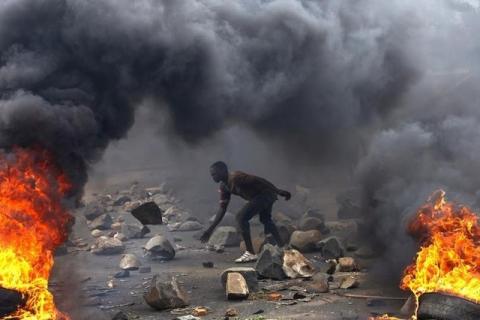Advertisement
Three killed in Burundi attacks ahead of Ban visit
NAIROBI (Reuters) - Three people were killed in gun and grenade attacks in Burundi, officials said on Monday, just hours before the arrival of U.N. Secretary-General Ban Ki-moon who is trying to end the bloodshed over President Pierre Nkurunziza's disputed re-election.
The United Nations is under growing pressure to show it can halt the violence, two decades after the 1994 genocide of ethnic Tutsis and moderate Hutus by the Hutu majority in neighboring Rwanda, which has a similar ethnic make-up to Burundi.
Celestin Singirankabo, head of a district 50 km (30 miles) east of the capital Bujumbura, said gunmen killed two people late on Sunday when they opened fire in a bar.
Separately, deputy police spokesman Moise Nkurunziza said one person had died and another had been wounded in a grenade attack at a Bujumbura market on Monday morning.
No group has claimed responsibility for the attacks but the government says there are now three rebel outfits fomenting violence, including two made up of renegade soldiers.
The opposition accuses government troops of arbitrary arrests, disappearances and extra-judicial killings.
More than 400 people have been killed since April when Nkurunziza said he would run for a third term, a move opponents dismissed as unconstitutional and sought to prevent by staging street protests.
In May, a group of soldiers tried to depose Nkurunziza in a failed coup.
Ban is due to meet Nkurunziza on Tuesday after arriving late on Monday. It is not immediately clear what plan Ban will bring to stem the violence, if any.
Nkurunziza has already rejected plans by the African Union to send peacekeepers to ease tensions in the Great Lakes nation, which diplomats fear is sliding toward another civil war.
As many as 300,000 people died in an ethnically charged civil war in Burundi that ended in 2005.
In a sign of the AU cranking up the diplomatic pressure, South Africa said President Jacob Zuma would fly to Bujumbura on Feb. 25-26 with the leaders of Mauritania, Senegal, Gabon and Ethiopia to "assist with addressing the political situation".
(Additional reporting by Ed Cropley; Writing by George Obulutsa; Editing by Alison Williams)



















Add new comment